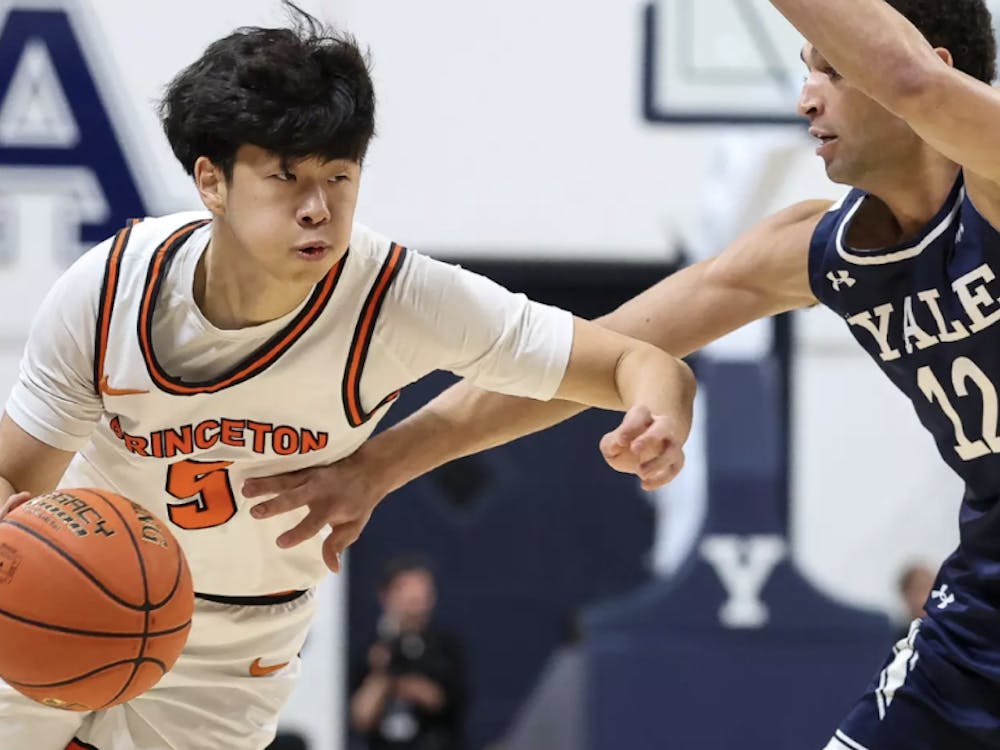The 2005-06 school year marked the 20th consecutive year that Princeton finished first in the Ivy League's all-sport standings. Tiger teams won 13 Ivy League championships, and the athletic program again reached the top-50 in the Director's Cup — which ranks the best overall Division I athletic programs in the nation — the only non-scholarship school to do so.
So, you might conclude, Princeton students are good at winning. Really good. Good at competition. What goes unnoticed, perhaps, is the full-bodied embrace University students give to competition, in all its many forms.
The most obvious form may be academics, but let's not waste our time on such trivialities; the most highly attended event last year of the entire school year, hands-down, was the second annual school-wide dodgeball tournament. Driven to compete in a game where any underdog had a chance to make it big, hundreds came out, supplied with color-coordinated t-shirts and fought like warring tribes armed only with small rubber balls.
But the dodgeball tournament still had a form of motivation external to that innate competitive drive: cashola. A four-figure cash prize was offered to the winning team, which may have obscured some otherwise evident truth of our animal nature.
To find the true competitors at Old Nassau — and there are many — one must look at how Princeton students spend their leisure time. For college is a time of nearly unbounded leisure, and every day and every night offers the opportunity to spend it either quietly whiling away the hours alone or engaged in fierce and epic struggle.
A default for many students these days in idling away their hours is that eternal glowing screen of life: television. The recent surge in popularity of serial DVDs and downloadable episodes has led to rampant one-upsmanship in students loudly declaring just how many episodes of "Lost" they consecutively watched last night, and it's getting to be just a bit excessive. Indeed, unlike all the other topics of this column, competition based on hours spent in front of the screen lacks a skill to drive differentiation, thus relegating it to the underclass of competitive outlets.
When most of us came to Princeton, we had no idea what a "power slide" was. Now, every red-blooded male — and more than a few females — at this school know that this move is an indispensable weapon in the arsenal of a topnotch Mario Kart player. Many of these campus couch-jockeys, even varsity athletes and eating club bicker chairs, find themselves near the top online lists of best-ever times after years of struggle, validating their hours of inanity.
As technology progresses, other video games have taken the place of the once-dominant games of Mario Kart and Goldeneye, unleashing Tiger Woods Golf and other new and high-resolution sources of simultaneous roommate embitterment and bonding upon the world.

Of course, old standbys never really fade away, and some forms of competition have been dominated by Princetonians for years. Woodrow Wilson is said to have played table tennis in his office when he was president of the University, and last year the University club table tennis team placed second in the country, vindicating those Rocky Common Room regulars looking to hustle any and all passersby.
In even more mundane leisurely pursuits, Tigers have taken their dedication to the next level, with a team of four this summer fighting its way to the national runner-up position in the timeless card game of bridge.
Finally, I would be remiss if in a discussion of competition on campus there was no mention of those twin pillars of virtue: Beirut and Robo.
'Ruit, as its ardent devotees refer to it, is more of a slow-paced affair, reminiscent of a game of golf, with skill levels similarly varying from weekend duffers to veritable professionals. Two teams of two, standing across a table from one another, face off head-to-head in a turn-based game with that unquantifiably delectable blend of stochastics and skills that inevitably creates the alternating thrills and heartbreak that drive competitive addiction.

Robo, 'ruit's intense little brother, is unique to Princeton, and can only be accurately described as a sport, as opposed to the game that is Beirut. Like any good sport, there are periods requiring unmitigated focus, sporadically interspersed by moments of calm to reassess and sally forth yet again into the chaos of real-time play. Like 'ruit, Robo requires only basic knowledge of the rules to get involved, but practically infinite sources of variation and complexity to differentiate the masters from the mere experts; like our favorite childhood board games, it takes just a minute to learn, a lifetime to master.
All this begs the question: is the level of competitiveness on campus too much? Should we each follow the timeless words of the Eagles and just "take it easy"? You first.







